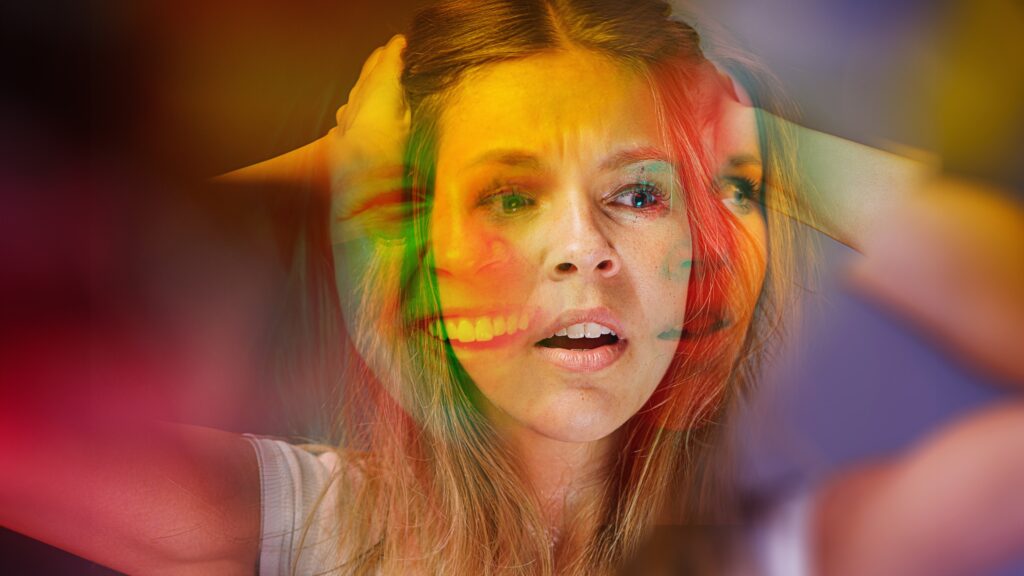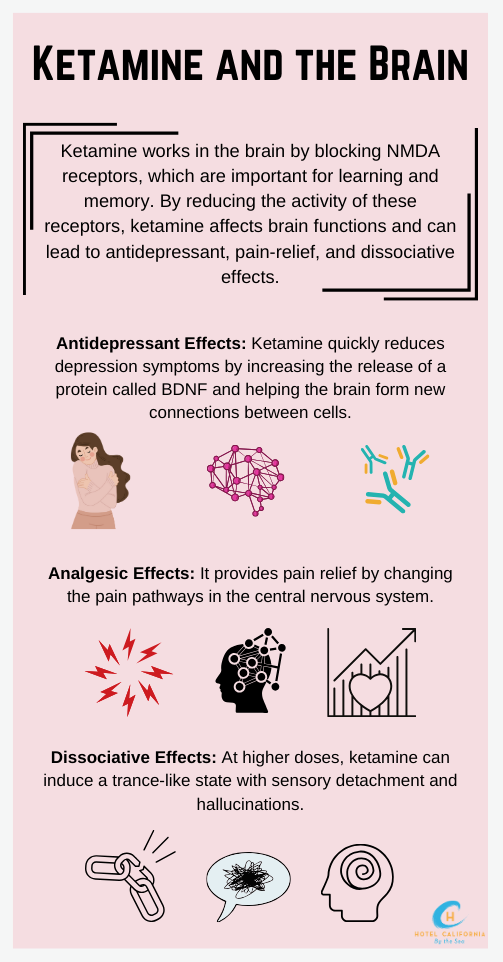Ketamine and Bipolar Disorder
Bipolar disorder is a psychiatric mental illness often associated with morbidity and a high suicide rate. It affects an estimated 3% of adults in the United States. Compared to other psychiatric disorders, bipolar disorder has the highest lifetime risk of suicide with the majority of patients experiencing symptoms of depression for a significant part of their lives. Bipolar disease causes people to experience extreme changes in mood, energy and behavior. The most common and notable characteristics of bipolar disorder include manic episodes, heightened emotions, erratic behavior and risk for harmful actions. According to a new 2022 review, studies and evidence are showing the beneficial use of ketamine treatment therapy to help treat some aspects of bipolar disorder. Can ketamine therapy help treat this condition?

Currently, ketamine is not FDA-approved to treat symptoms of bipolar disorder but it has been frequently used off-label in specialized mental health care clinics. Recent studies have shown that ketamine treatment therapy can help to remove the urgency in impulsive behaviors and significant improvements in depressive symptoms in those who are diagnosed with bipolar disorder. Ketamine treatment for bipolar disorder is still very new.
There is currently a significant unmet need for short and long-term treatment options for those diagnosed with bipolar depression. Traditional medications such as antidepressants and benzos often take weeks or months to become effective in treating symptoms of bipolar depression. Psychotherapy can also take time before it becomes successful and may not be accessible to everyone. One major benefit of ketamine therapy is how quickly it can elevate a patient’s mood and provide relief from depressive symptoms. Of course, ketamine therapy is only used when all other traditional methods have not been effective and it is recommended to be used alongside other medications, and cognitive therapies.
Bipolar Disorder
People diagnosed with bipolar disorder have the highest risk of suicidal acts compared to all other psychiatric disorders. In fact, suicide accounts for about 15-30% of deaths in patients with bipolar disorder. This alarming statistic has continued to concern medical professionals. Traditional treatments for bipolar disorder include medications psychotherapy, and other supportive strategies. Common medications prescribed to treat symptoms include antipsychotics, mood stabilizers and antidepressants. However, there is currently no official approved medication created specifically for treating bipolar disorder.
There are three main types of bipolar disorder. Bipolar I is characterized as experiencing manic episodes or episodes so extreme they require hospitalization for at least 7 days. Afterward, patients will experience depressive episodes that can last around 2 weeks or more. Bipolar II is characterized by cycles of both hypomanic and depressive episodes. This is often referred to as having mixed episodes. If a person displays symptoms of cyclothymic disorder, they usually do not have the official diagnostic criteria for depression or hypomania. However, they still experience the highs and lows typical of a person with bipolar disorder.

What is Ketamine?
Ketamine is a dissociative anesthetic that makes users feel detached from their immediate environment, surrounds and feelings of both physical and emotional pain. When used recreationally it can produce hallucinogenic effects in which users feel removed from their bodies and therefore removed from pain. Not generally considered an addictive drug, there are some risks for developing addiction. It is most common when large amounts of the drug are used and if it is used alongside other mind-altering substances such as alcohol.
Ketamine works by blocking the signals in the brain that tell us to feel pain. It interacts with several systems in the body and brain chemical receptors such as dopamine, serotonin and norepinephrine. Research believes that ketamine causes a slow release of molecules that can create new communication pathways between the neurons in the brain. This process is called synaptogenesis. It can help improve how your brain regulates your mood.
Recently ketamine has sparked interest in the medical community on its benefits to treating certain types of mental health conditions. Some clinical and medical providers believe ketamine therapy can be used to help treat severe symptoms of depression in patients who are not responding to all other methods of traditional treatment.
Ketamine and Bipolar Disorder
Ketamine therapy for the treatment of bipolar disorder is fairly new. It is not an FDA-approved treatment. However, it has seen increased popularity among alternative medical clinics. Today, there are currently around 140 ongoing trials of ketamine-based therapy for the treatment of bipolar depression. In one of the first studies that used ketamine therapy, patients reported experiencing antidepressant effects after a single infusion in addition to other traditional mood stabilizers.
Research has found that ketamine therapy can potentially help treat targeted aspects of bipolar disorder such as reducing suicidal ideas, addressing emotional flatness, addressing depression and lack of joy as well as help to soothe symptoms of anxiety. Typical ketamine therapy treatments for bipolar disorder consist of treatments once or twice per week over a 6-8 week period.
Why are clinicians turning to ketamine therapy for treatment? Research has found that ketamine therapy is fast-acting and has been shown to reduce symptoms of severe depression within an hour of treatment administration. This is in comparison to traditional treatments such as mood stabilizers and antidepressants, which can take as long as a few weeks to take effect. Ketamine has been shown to provide immediate relief.
Check Your Insurance Coverage for FREE
Find out if your insurance covers addiction treatment in minutes. We accept most insurance!
Ketamine Therapy for Bipolar Depression
Most of the studies regarding ketamine therapy for bipolar depression are centered around short-term use of the drug. There are yet to be studies showing the long-term effects of ketamine therapy. However, despite only having evidence resulting from short-term use of the drug, medical researchers and clinicians are hoping to see positive results. In some studies, it can start reducing depressive symptoms in bipolar disorder within the first 40-60 minutes. These pain relief effects can last up to 45 minutes or so after treatment with a slow comedown for the rest of the day. Currently, ketamine therapy has only been used for short-term treatment.
- Biochemical – The effects of ketamine alone can help significantly reduce bipolar depression symptoms in patients after the first treatment.
- Psychotherapeutic – Ketamine therapy can help amplify the effects of talk therapy and promote more open conversations within individual sessions.
- Psychedelic – Small doses of ketamine can induce a temporary altered state of mind and allow the user to discover deeper into their psychological and spiritual self.
Like any drug or medication, ketamine therapy can come with risks and even result in adverse side effects. However, this is dependent on each patient.
- Affective switch from depression to mania
- Side effects that mimic symptoms of a panic attack
- Falling too far into a k hole and unable to get out
- A brief psychotic episode
- Feeling paralyzed during treatment
- Feeling frightened
- Bladder or unordinary conditions
- Motivational impairment
- Altered muscle tension
- Anxiety
- Elevated pupils
- Increased blood pressure
- Headache and nausea
- Vision changes
- Unwanted feelings of dissociation
Reach out to Hotel California by the Sea
We specialize in treating addiction and other co-occurring disorders, such as PTSD. Our Admissions specialists are available to walk you through the best options for treating your addiction.
Treatment for Substance Use Disorder
Ketamine is a psychoactive substance that can produce feelings of dissociation and is often used recreationally. Now, many researchers and clinicians have found that ketamine treatment therapy can also help improve symptoms of treatment-resistant depression linked to mental health conditions such as bipolar disorder. However, ketamine remains a controlled substance due to the number of those who abuse the drug for recreational purposes. An addiction to psychedelic substances can be very dangerous. Behavioral treatment programs such as Hotel California by the Sea provide the tools, resources and support clients need to overcome their addiction.
We specialize in the treatment of substance use disorders and co-occurring mental health conditions. We offer treatment in different levels of care including detox, residential, PHP and IOP. We utilize evidence-proven treatment methods such as CBT, DBT and EMDR therapy. Hotel California by the Sea offers a unique approach to treatment by addressing every aspect of addiction including emotional, physical and psychological factors.
References:
https://pmc.ncbi.nlm.nih.gov/articles/PMC7670087
https://www.medicalnewstoday.com/articles/ketamine-bipolar
https://www.psychiatryfortworth.com/blog/ketamine-infusion-therapy-for-bipolar-disorder-what-you-need-to-know
https://conciergemdla.com/blog/ketamine-bipolar-disorder-treatment/
https://www.choosingtherapy.com/ketamine-for-bipolar/


